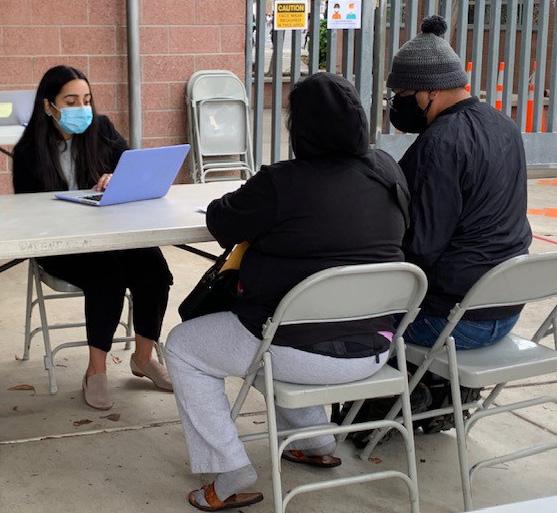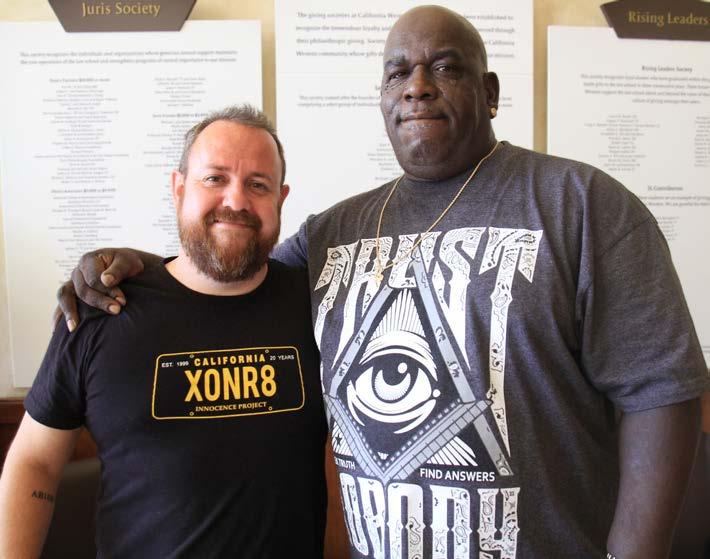
4 minute read
California Western’s Clinics
COMMUNITY LAW PROJECT
The Community Law Project (CLP) ended 2021 on a high note, having served hundreds of clients through a combination of live and virtual services while simultaneously training over 40 students to be effective and compassionate advocates for those in need. Under the supervision of our staff attorneys, our students successfully drafted letters to landlords convincing them to improve poor conditions in tenants’ apartments, guided consumers who have been defrauded through the paperwork to file a suit in small claims court, and helped young adults determine if they qualified for a renewal of their DACA status. Each CLP student completed their commitment to CLP through completion of a community education project. These projects ranged from the education through Zoom of 30 low income Latinx community members on their employment rights during the height of the pandemic to the creation of self-help videos for individuals representing themselves in court to the publication and disbursement of user-friendly Spanish / English materials to help victims of domestic violence understand resources that are available for them. We start 2022 with three to four live clinics
Advertisement
The New Media Rights (NMR) clinic returned to in-person clinic work this Spring. Clinic students provided services on the new KPBS documentary Skate SD: Building Skateboarding’s Future, which launched in November 2021. Students are currently assisting clients, including filmmakers, tech startups, musicians, illustrators, and authors. The clinic recently received two significant grants. One, Grant for the Web, is from the Mozilla
A California Western student assisting clients at Rosa Parks Elementary School.
each week, all of which continue and enhance our collaborations with non-legal partners as we provide holistic services to each individual who comes to us for assistance. We are excited about returning to more in-person interactions with our students (and in our new on-campus office space!) and more opportunities to educate our community in whatever format works best for each of the diverse communities we serve.
NEW MEDIA RIGHTS

New Media Rights staff and interns Foundation and Creative Commons, and supports the clinic’s work with clients utilizing new forms of web monetization that avoid privacy-invasive and advertising-reliant technologies. The other is with the Rose Foundation and supports the program’s work with clients around consumer technology.
CALIFORNIA INNOCENCE PROJECT
Over the last 20 years, CIP, as part of the California Innocence Coalition (CIC) - comprised of the three innocence projects in the state - has been successful in getting a number of laws passed in many areas affecting the criminal legal system. Among other changes, the implementation of these laws have allowed people to get DNA evidence preserved and tested in their case after the conviction; permitted post-conviction discovery where defendants received sentences of fifteen years or more; and improved the standard for the introduction of new evidence – discovered after trial – bringing California in line with the majority of states in the country. The purpose of these legislative changes is to address the systemic issues that we see in the criminal legal system again and again in investigations, prosecutions, convictions, and sentences across California. CIC focuses its efforts solely on legislation that prevents wrongful convictions from occurring, creates avenue relief for an innocent person once incarcerated, and helps those who have been exonerated get back on their feet once they’re released.
Sadly, even when innocent people are released, they still face tremendous hurdles to reintegrate and get back on their feet after their years – sometimes decades – of wrongful incarceration. In response to this injustice, CIC crafted and shepherded Senate Bill 446 (SB 446) during the 2021 legislative session. The legislation, authored by Senators Steve Glazer and Josh Becker, ensures the wrongfully convicted are rightfully compensated by California.

CIP Associate Director Alex Simpson with CIP exoneree Tim Atkins. Tim was forced to wait 12 years to be rightfully compensated for his 23 years or wrongful incarceration.
California has long recognized its obligation to compensate the innocent for their wrongful incarceration. However, the process has proven to be inefficient, unduly burdensome, and not consistently just. Even after their convictions were thrown out, exonerated persons had to prove to the State’s Compensation Board – all over again – they were innocent. Even when a court finds an individual was wrongfully convicted and reverses their conviction, and even when the prosecution dismisses the charges –indeed, even when they are acquitted on retrial – these innocent individuals must then, through additional litigation, affirmatively prove that they are innocent to receive compensation. The claims process typically takes years to complete. It involves lengthy litigation and inconsistent results. It leaves many wrongfully convicted citizens without compensation. SB 446 recognizes that once a person is found innocent in court, they should not have to prove innocence a second time to receive state compensation they are entitled to based on their years of wrongful incarceration, illustrating that once an innocent person is released from prison they should be compensated as soon as possible and not have to continue battling against the government.
The wrongfully convicted have lost years of their lives due to their incarceration and years in litigation proving their innocence in the courts. These individuals deserve a just and comprehensive process to ensure that they are rightfully compensated. SB 446 makes that possible. On October 4, 2021,California Governor Gavin Newsom signed SB 446 into law.









